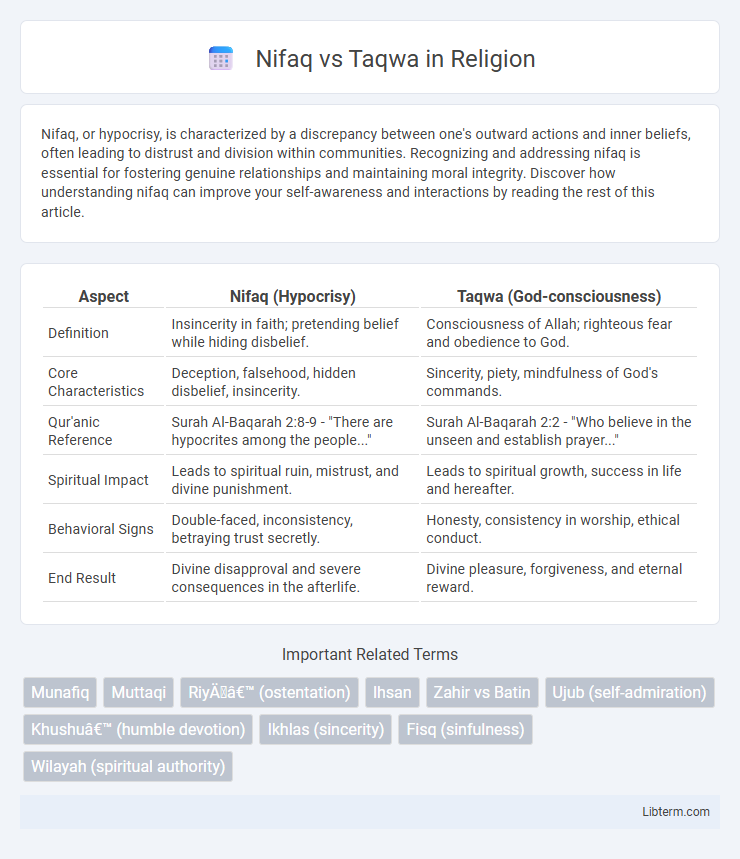Nifaq, or hypocrisy, is characterized by a discrepancy between one's outward actions and inner beliefs, often leading to distrust and division within communities. Recognizing and addressing nifaq is essential for fostering genuine relationships and maintaining moral integrity. Discover how understanding nifaq can improve your self-awareness and interactions by reading the rest of this article.
Table of Comparison
| Aspect | Nifaq (Hypocrisy) | Taqwa (God-consciousness) |
|---|---|---|
| Definition | Insincerity in faith; pretending belief while hiding disbelief. | Consciousness of Allah; righteous fear and obedience to God. |
| Core Characteristics | Deception, falsehood, hidden disbelief, insincerity. | Sincerity, piety, mindfulness of God's commands. |
| Qur'anic Reference | Surah Al-Baqarah 2:8-9 - "There are hypocrites among the people..." | Surah Al-Baqarah 2:2 - "Who believe in the unseen and establish prayer..." |
| Spiritual Impact | Leads to spiritual ruin, mistrust, and divine punishment. | Leads to spiritual growth, success in life and hereafter. |
| Behavioral Signs | Double-faced, inconsistency, betraying trust secretly. | Honesty, consistency in worship, ethical conduct. |
| End Result | Divine disapproval and severe consequences in the afterlife. | Divine pleasure, forgiveness, and eternal reward. |
Understanding Nifaq: Definition and Origins
Nifaq, in Islamic theology, refers to hypocrisy characterized by the outward display of faith while concealing disbelief or malicious intent, contrasting with the sincerity embodied by Taqwa. Originating from the Arabic root "nafaqa," meaning to split or double, Nifaq denotes a spiritual and moral duality where one's actions and true beliefs diverge. Understanding Nifaq entails recognizing its implications as a severe spiritual failing that undermines both personal integrity and communal trust in Islam.
Defining Taqwa: Essence and Importance
Taqwa, in Islamic terminology, signifies consciousness and fear of Allah, leading to righteous behavior and moral integrity. It embodies a protective quality that guards believers from sinful actions by cultivating self-restraint and sincere devotion. Unlike nifaq (hypocrisy), which involves deceit and insincerity in faith, taqwa reflects genuine piety and spiritual mindfulness essential for attaining Allah's pleasure and worldly success.
Key Differences Between Nifaq and Taqwa
Nifaq refers to hypocrisy, where an individual's outward behavior contradicts their inner beliefs, often leading to deceit and moral corruption. Taqwa, on the other hand, signifies God-consciousness and mindfulness in actions aligned with Islamic teachings, promoting sincerity and righteousness. The key difference lies in Nifaq's insincerity versus Taqwa's genuine piety and commitment to ethical conduct.
Signs and Traits of a Munafiq (Hypocrite)
Signs of nifaq (hypocrisy) include persistent dishonesty, deceitfulness, and outward show of faith without inner sincerity, often accompanied by double standards in behavior. A munafiq (hypocrite) typically displays traits such as insincerity in prayer, breaking promises, backbiting, and hiding true intentions to deceive others while maintaining the appearance of piety. These behaviors contrast sharply with taqwa, which is characterized by genuine God-consciousness, consistent righteousness, and transparent devotion.
Characteristics of People with Taqwa
People with Taqwa embody consciousness and fear of Allah, demonstrated through sincere worship, integrity, and steadfastness in obeying divine commands. Their actions reflect humility, patience, and a constant effort to avoid sins while seeking Allah's forgiveness. In contrast to Nifaq, marked by hypocrisy and deceit, Taqwa manifests in genuine faith, ethical conduct, and a heart devoted solely to spiritual sincerity.
Quranic Verses on Nifaq
Nifaq, or hypocrisy, is strongly condemned in the Quran, with verses such as Surah Al-Baqarah (2:8-9) describing hypocrites as those who claim faith but conceal disbelief, deceiving both God and believers. Surah An-Nisa (4:142) highlights that hypocrites try to deceive Allah, but He counters their deception, and Surah Al-Munafiqun (63:1) states that hypocrites utter lies while attempting to mislead others. In contrast, Taqwa signifies God-consciousness and sincerity, representing true faith and obedience emphasized throughout the Quran as the path to divine pleasure and success.
Quranic Verses on Taqwa
Taqwa, repeatedly emphasized in the Quran, signifies God-consciousness and piety, serving as the foundation for righteousness and divine guidance (Quran 2:2, 3:102). Verses such as Surah Al-Baqarah 2:2 and Surah Ali Imran 3:102 highlight Taqwa as a means to attain mercy, forgiveness, and success in this life and the hereafter. In contrast, Nifaq, or hypocrisy, is condemned in the Quran (Quran 4:142), as it represents insincerity and disbelief disguised as faith, countering the sincere devotion encapsulated by Taqwa.
Consequences of Nifaq in Islamic Teachings
Nifaq, or hypocrisy, in Islamic teachings leads to severe spiritual and social consequences, including the loss of Allah's mercy and trustworthiness within the Muslim community. It undermines the unity of the ummah by fostering deceit and division, creating a discordant environment contrary to the principles of Taqwa, which emphasizes sincere fear of Allah and righteousness. Persistent nifaq results in divine punishment both in this life and the hereafter, as highlighted in the Qur'an and Hadith, reflecting the grave nature of insincerity in faith.
Benefits and Rewards of Practicing Taqwa
Practicing taqwa cultivates a deep consciousness of God that fosters moral integrity, leading to inner peace and spiritual fulfillment. It brings immense rewards such as divine mercy, forgiveness, and success in both worldly and hereafter life as emphasized in Quranic verses and Hadith. Unlike nifaq, taqwa strengthens faith, promotes righteousness, and secures protection from harmful deception and hypocrisy.
Nifaq vs Taqwa: Lessons for Daily Life
Nifaq, characterized by hypocrisy and deceit, undermines personal integrity and social trust, whereas Taqwa signifies God-consciousness and sincere righteousness that guide ethical behavior and spiritual growth. Embracing Taqwa in daily life fosters genuine humility, accountability, and moral resilience, contrasting the destructive effects of Nifaq on individual character and community cohesion. Lessons from these concepts emphasize cultivating inner sincerity and mindful actions to build authentic relationships and a harmonized society.
Nifaq Infographic

 libterm.com
libterm.com